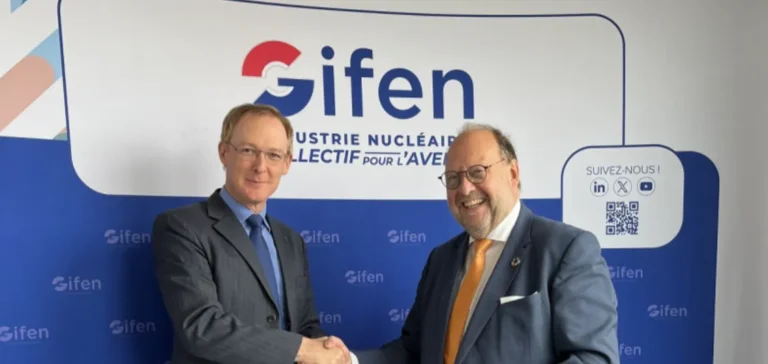The Groupement des Industriels Français de l’Énergie Nucléaire (Gifen) and the Belgian Nuclear Forum (BNF) have signed a cooperation agreement designed to structure and intensify ties between the nuclear sectors of both countries. This initiative follows a series of intergovernmental commitments to revive nuclear momentum at both bilateral and European levels.
An operational framework to strengthen industrial exchanges
The agreement includes several concrete actions to be implemented in the coming months. These include information-sharing sessions on French and Belgian nuclear programmes, dissemination of best industrial practices, and meetings between the respective members of both federations. The objective is to stimulate the formation of technical and commercial alliances, as well as to support the relaunch of joint industrial projects.
According to the terms of the agreement, BNF and Gifen also plan to organise joint actions to reaffirm the role of nuclear energy in energy security and industrial sovereignty strategies. Special focus will be given to the development of new reactors, including small modular reactors (SMRs), as well as to training and technological innovation.
Strategic convergence after recent political commitments
The signing comes a few months after the declaration of intent signed in July by the energy ministers of both countries, aimed at intensifying cooperation across the entire nuclear lifecycle. This declaration covered the extension of existing reactors’ lifespans, coordination of critical supply chains, and the development of joint research projects.
On the Belgian side, this shift is part of a broader revision of national energy policy. In May, the federal parliament voted to repeal a 2003 law banning the construction of new nuclear capacity. In France, the programme unveiled in 2022 outlines the deployment of six new EPR2 reactors, with an option for eight more, to reinforce the national nuclear base.
An industrial relay to governmental initiatives
The leadership of the Belgian Nuclear Forum sees this agreement as a logical extension of recent political commitments. For Serge Dauby, Managing Director of BNF, “it is ultimately the industrial players who implement political ambitions”. He also emphasises the importance of a strong industrial foundation to meet long-term challenges, particularly regarding energy sovereignty.
Olivier Bard, General Delegate of Gifen, recalled that France and Belgium have a shared tradition in civil nuclear energy. He stated that today’s agreement marks a significant operational step, with both organisations committed to undertaking joint actions to support the performance and growth of their member companies.






















